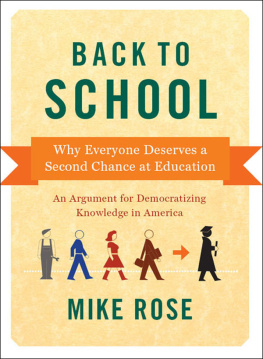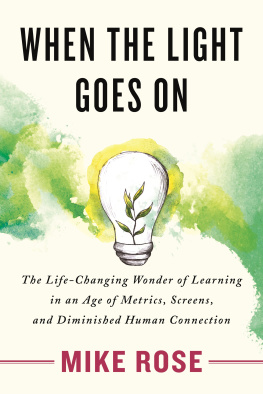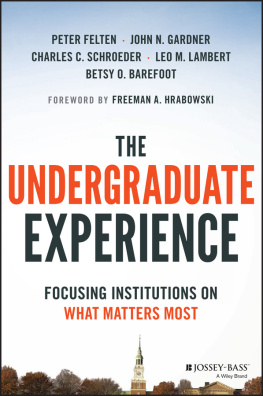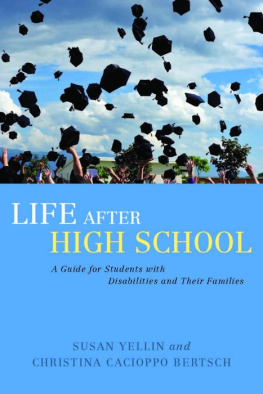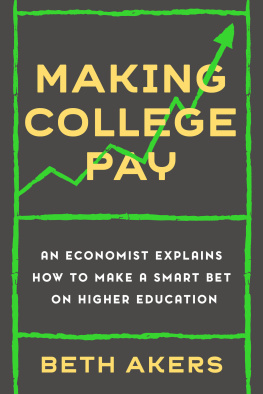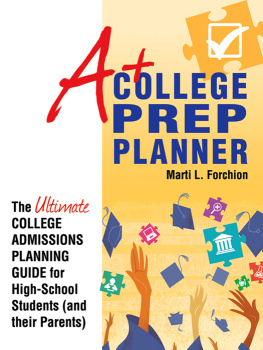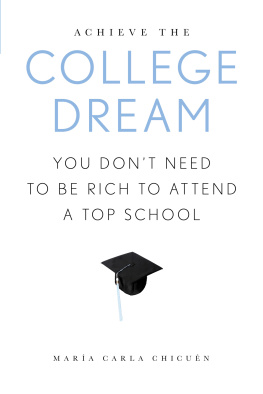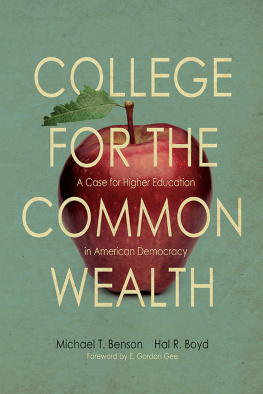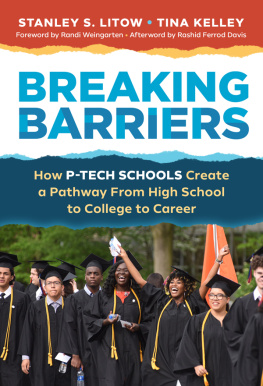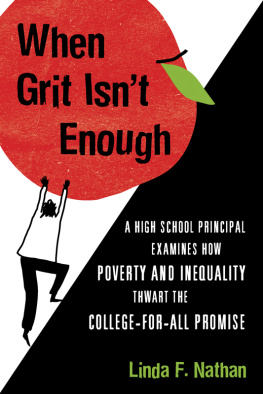Contents
Page List
Guide

Back to School
ALSO BY MIKE ROSE
Why School?
Lives on the Boundary
Possible Lives
The Mind at Work
An Open Language
Writers Block
When a Writer Cant Write
Perspectives on Literacy
(edited with Eugene Kintgen
and Barry Kroll)
Critical Strategies for
Academic Thinking and Writing
(with Malcolm Kiniry)
Literacy
(edited with Ellen Cushman,
Eugene Kintgen, and Barry Kroll)
Back to School
Why Everyone Deserves
a Second Chance at Education
MIKE ROSE

2012 by Mike Rose
All rights reserved.
No part of this book may be reproduced, in any form, without written permission from the publisher.
Requests for permission to reproduce selections from this book should be mailed to:
Permissions Department, The New Press,
120 Wall Street, 31st floor, New York, NY 10005.
Published in the United States by The New Press, New York, 2012
Distributed by Two Rivers Distribution
CIP data is available
ISBN 978-1-5955-8803-6
The New Press publishes books that promote and enrich public discussion and understanding of the issues vital to our democracy and to a more equitable world. These books are made possible by the enthusiasm of our readers; the support of a committed group of donors, large and small; the collaboration of our many partners in the independent media and the not-for-profit sector; booksellers, who often hand-sell New Press books; librarians; and above all by our authors.
www.thenewpress.com
Composition by Bookbright Media
This book was set in Centaur MT
2 4 6 8 10 9 7 5 3 1
To those students who are working so hard to create a second chance for themselves
To the dedicated teachers and tutors, administrators, counselors, and front-desk staff who keep the door open
And to my parents, Tommy Rose and Rose Meraglio Rose, who came to the United States as children, their parents seeking a better life
CONTENTS
THIS IS A BOOK about people in tough circumstances who find their way, who get a second... or third... or fourth chance, who in some cases feel like they are reinventing themselves. Education can play a powerful role in creating that second chance.
At a time when public institutions are held in low regard and schools at all levels are under assaultfor good reasons and badBack to School demonstrates what education can do, even though it was often earlier schooling that let people down. The stories in this book affirm the transformational potential of the college classroom, the occupational workshop, the tutoring center, the mentoring relationship.
One of the defining characteristics of the United States is its promise of a second chance; this promise is central to our vision of ourselves and to our economic and civic dynamism. When we are at our best as a society, our citizens are not trapped by their histories. Sadly this possibility is shrinking, partly because of a damaged and unstable economy but more so because of our political response to the economy. There are better ways to respond and to foster the growth of a wider sweep of our population. I hope Back to School points us in that direction.
Back to School
YOU MIGHT DISCOVER SOMEBODY you never knew you were, Henry says with a big voice as he turns his wheelchair sideways to look at me. Thats basically what happened to me when I started taking classes here.
Henry is finishing up his requirementsEnglish, sociologyfor his associate of arts degree, and hes sending applications to universities across the state. Outside the state as well. His goal is to work in mediation and conflict resolution, particularly with teenagers, kids like he once was, who are searching for an identity.
Henry is a stocky guy, broad across the chest, with powerful forearms from years in a wheelchair. He wears a baseball cap backward, a sweatshirtboth with the local teams logofingerless gloves, baggy shorts, and socks that come up to his knees. His face is vibrant with earnestness.
Henry did well in his first two years of high school, made the honor roll, played football and baseball and wrestled. Then, going into his junior year, he took a wrong turn and started doing young, foolish, dumb stuff. He was caught on campus with marijuana, expelled for a full year, which he spent in an alternative school, came back and graduated on time. College was the last thing on my mind, he says, so he went to work in a warehouse and got more involved in street life, running around like a chicken with its head cut off. Two years after graduation, he was arrested for firing a gun into the air during a showdown with a rival gang. He did nineteen months in state prison. In there all youre known by is your nickname and the gang youre from. He got more of his tattoosup and down his arms, curving along his neckwhile locked up. When I came out, I went right back to doing the same stupid stuff that got me in trouble. Then three months to the day after release, a guy from a rival gang shot him, one bullet hitting his spine, paralyzing him from the waist down. Youre living the fast life, and the next thing you know, your whole world is changed.
The year after the shooting was an unreal stream of hospitals and rehab centers, dark thoughts and unsuccessful attempts to stay with his girlfriend. He reports all this without evidence of self-pity or bitterness, but his eyebrows raise in disbelief when he tells me that he went back once again to the streets, trying to pick up where he left off. I picture himfor I have seen this over the yearsin the midst of four or five guys, swapping stories, big talk, a can of malt liquor cradled in his lap. More of going nowhere.
But his injuries and immobility made him vulnerable to illness, and he was feeling more and more at a loss. Then one day he realized, You have no place being out on the streets, and that realization eventually led him to go home to his parents house, a place where people cared about him. I was in my right mind again. And what he calls his rebirth began.
During those first few months at home, Henry was alone during the day, watching television, surfing the web, thinking about his life. One day, and hes not sure exactly how, he came across information on the community college he now attends. As he read more and more about the college, he knew he had to go, felt an urgency about it, and the next morning, with whatever documents he could lay his hands on, he got on the commuter train and enrolled right there that day.
Accounts like this are common among the students Ive taught and interviewed: a flash of insight, a lightbulb going on, a sudden realization that your life has to change. The insight can hit in the flow of powerful eventsa guy lands in jail for the umpteenth time, a loved one leaves you or dies, a seemingly stable job is torn away. It also can come while walking down the street or, as with one young woman, looking out across the retail store where she worked and imagining herself still there in ten years. People say things like What am I doing? Why am I here? Whats my purpose in life? Why did God put me on this earth?
Henrys paralysis is clearly the life-changing event in his story, but after further time on the streets, and weeks and weeks of being alone with himself, the images of the college on his computer screen called forth a lot of thoughts that catalyzed action: Its never too late to go back to school. I just felt like Im here for a purpose. Its my turn to give back to my family. I dont have the use of my legs, but I have the use of my mind.

